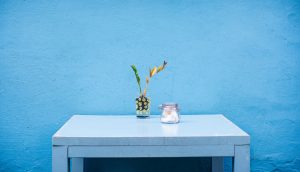
The following reflection originally appeared in the newsletter I sent out on April 12th, 2022.
Feel free to read just the bold words and skip the rest.
Introduction
While I’ve never exactly identified as a minimalist, many of the principles are deeply in line with Buddhist philosophy. In turn, it’s occurred to me that in a certain light, minimalism is actually a powerful spiritual practice.
On a broad level, minimalism is about minimizing clutter in our lives. As it’s a lifestyle, instead of owning tons of stuff or filling our schedule with endless activities, we only take on what truly adds value to our lives.
Why Practice Minimalism?
In the context of spiritual practice, we don’t practice minimalism for its own sake or for stylistic reasons (like we might see in a fashion magazine). Instead, we live a minimalist lifestyle because we understand that accumulating things doesn’t provide deep and lasting happiness.
With physical possessions, it may be easy to see the false promise of accumulating “luxury items,” like fancy cars, big boats, always having the newest phone, or wearing designer clothing.
However, even as someone who has been a possession-less monastic and nowadays lives pretty simply, I sometimes need to humble myself and recognize how strong our cultural conditioning is to consume. To eat out instead of cooking my own food. To buy a new jacket instead of getting my broken zipper repaired. To buy the impulse item at the grocery store checkout line. To fill my life with the latest gadgets, comfort items, and backpacking level-ups.
Similarly, when we use social media, search Google, or go to the store, we’re bombarded with advertisements telling us what we need to have to be happy. Add all this together, and I sometimes catch myself in what Joseph Goldstein calls, “catalogue mind,” asking a question like, “what things do I need to buy?” In these moments, it’s as if I’m almost searching for something to want.
In turn, one simple practice for minimalism is to not go searching for things to buy/acquire, but if something naturally occurs to you to buy/acquire, unless it feels really important, wait at least three days before taking action. If you’re not sure it’s really important, ask yourself questions like, “would I experience some degree of suffering if I didn’t have this?” “Would having this item add a notable amount of value to my life?” or more simply, “do I really need this?”
In a way, minimalism as a spiritual practice is asking us to reflect deeply on what really brings us well-being, and have the courage to put that into action.
Minimalism As A Practice Of The Middle Way
To be clear, minimalism is not advocating for completely getting rid of everything in our lives. Minimalism is not monasticism. Instead, minimalism is a practice of the middle way, where we find the balance between indulgence and rejection.
Basically, we only consume things that are aligned with our values and that truly benefit our lives.
For example, we all need to eat, but do we need to eat at five-star restaurants? Is buying poison-sprayed food really worth the two-dollar savings —i.e. are we truly living in or near poverty, or are we just living with an allow-myself-to-consume-as-much-as-possible mindset?
Or, we may all value some degree of relaxation, rest, and leisure, but do we really need to buy something for that, or could we just take a walk, lie down, or listen to music? Likewise, is social media or television really a high-value activity, or are there more fulfilling ways to relax?
Minimalism Beyond Physical Possessions
In Chogyam Trungpa Rinpoche’s classic book, Cutting Through Spiritual Materialism, he talked about how we look to accumulate not just physical possessions, but even things like spiritual attainments. Really, this is getting at the Second Noble Truth of Buddhism, which notes that craving is the cause of suffering.
Craving is the force inside ourselves that says, “I’m not okay right now, but I will be satisfied when I get X, or I experience Y.” It could be acquiring a physical possession, but it could also be wanting to “acquire” any of the following:
- Spiritual states, like deep concentration, spaciousness, or awakening
- Emotional states, comfort, bliss, or in-love
- Dynamic or novel experiences, like traveling, sky diving, eating out, going hiking, or attending a basketball game
Again, there’s nothing wrong with any of these things. However, taking on minimalism as a spiritual practice, we know happiness and well-being are found in this very moment. In turn, we keep an eye on craving, and learn to be skeptical when it tries to convince us that XYZ is going to be the thing to bring us happiness or contentment.
What All This Leads To
What I’ve found is that minimalism opens up the ability to put our time, energy, and money into the things that matter most to us.
In that sense, minimalism is really about cutting the fluff out of our life and putting our attention on the highest priorities. Pair this with a devoted meditation practice, and that notion that “well-being is found in this moment” becomes not just a good idea, but rather a lived experience.
Anyhow, I encourage you to bring a little extra discernment into your consumption, whether that be around physical possessions or the things you consume with your time and energy. Maybe consider asking yourself often, “do I really need this?”
p.s. here’s a great documentary about minimalism.
—————
If you would like to get a monthly’ish email with reflections like this one, along with some event updates, sign up here for the newsletter.
